 Int'l Snow Sculpture Art Expo in Harbin
Int'l Snow Sculpture Art Expo in Harbin Sichuan money wall for dividend payment
Sichuan money wall for dividend payment Li Na crashes Belinda Bencic in 2nd round at Australian Open
Li Na crashes Belinda Bencic in 2nd round at Australian Open
 Shocking moments when PLA's weapons open fire
Shocking moments when PLA's weapons open fire Famous Lanzhou beef noodles
Famous Lanzhou beef noodles Armed Police hold anti-terrorism drill in SE China's Xiamen
Armed Police hold anti-terrorism drill in SE China's Xiamen Harbin Int'l Ice and Snow Festival opens
Harbin Int'l Ice and Snow Festival opens 'Jin' named the word of the year by cross-strait netizens
'Jin' named the word of the year by cross-strait netizens Chinese scientific expedition goes to build new Antarctica station
Chinese scientific expedition goes to build new Antarctica station
BEIJING, Jan. 21 -- The World Economic Forum (WEF), also known as the Davos Forum, opened its arms to China in 1979, when a Chinese delegation led by Qian Junrui, then director of the Institute of Economics of the Chinese Academy of Social Sciences, was invited to the forum.
Since then, China has been sending official delegations to the forum every year.
In June 1981, a China-Europe business leaders symposium was held in the Great Hall of the People in Beijing, where senior Chinese officials outlined China's plans for its economic development over the next decade. This was the first Davos Forum-related event held in China.
In 1992, then Chinese Premier Li Peng participated in the Davos Forum. He said that China aimed to achieve the status of a medium-level developed country by 2030 to 2050.
In January 2006, then Chinese Vice Premier Zeng Peiyan attended the forum with a speech highlighting Beijing's dedication to innovation and determination to achieve people-oriented, coordinated and sustainable development.
In June 2006, the Davos Forum set up an office in Beijing, the first of its kind outside Switzerland.
In January 2007, then Chinese State Councilor Hua Jianmin attended the WEF annual meetings in Davos, where he delivered a speech expounding China's stance on sticking to a scientific, harmonious and peaceful path of development.
In September 2007, Chinese port city Dalian hosted for the first time the meetings of the New Champions, or the Summer Davos, attracting over 1,700 political, business and civil leaders from 90 countries, who discussed the roles of new generations of fast-growing multinational companies in the world economy.
In September 2008, the second Summer Davos Forum was held in another Chinese port city, Tianjin, under the theme of "The Next Wave of Growth."
In January 2009, then Chinese Premier Wen Jiabao attended the annual meetings of Davos Forum, which was themed "Shaping the Post-Crisis World."
In his speech titled "Strengthen Confidence and Work Together for A New Round of World Economic Growth," Wen expounded China's understanding about and stance on the global financial and economic situation, as well as the policy measures it had taken in response.
In September 2009, Wen attended the third Summer Davos Forum, which was held in Dalian under the theme of "Reviving economic growth." Against the backdrop of a global financial crisis, the forum focused on how entrepreneurship, innovation and technology could boost the transformation and recovery of the world economy.
In January 2010, then Chinese Vice Premier Li Keqiang attended the WEF annual meetings in Davos, which were themed "Improve the State of the World: Rethink, Redesign, Rebuild."
At the forum, Li called for international cooperation and tolerance so as to ensure a sound recovery and sustainable development of the world economy.
In September 2010, Wen attended the Summer Davos Forum in Tianjin, which was themed "Driving Growth Through Sustainability."
The 41st WEF annual meetings were held in Davos in January 2011 with the theme of "Shared Norms for the New Reality." Global political and business leaders gathered together to brainstorm on the new global economic and political situation, with China continuing to be the focus of discussion.
In September 2011, Dalian hosted the fifth Summer Davos Forum with the theme of "Mastering Quality Growth." Premier Wen attended the opening ceremony with a speech that put emphasis on achieving higher, better and more lasting growth.
In September 2012, the sixth Summer Davos Forum, themed "Creating the Future Economy," was held in Tianjin. Wen also addressed its opening ceremony.
In September 2013, Chinese Premier Li Keqiang attended the seventh Summer Davos Forum in Dalian.
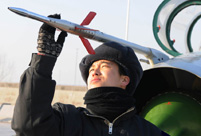 Su-30 fighter formation taking off for training
Su-30 fighter formation taking off for training 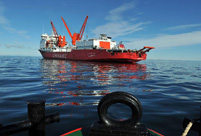 Xuelong carries on mission after breaking from floes
Xuelong carries on mission after breaking from floes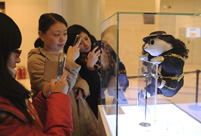 Charity exhibition raises money for panda protection
Charity exhibition raises money for panda protection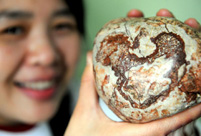 'Map of China' on the stone
'Map of China' on the stone 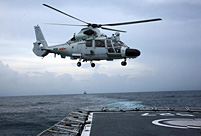 Chinese naval escort taskforce repels 4 suspicious vessels
Chinese naval escort taskforce repels 4 suspicious vessels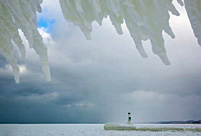 World's weekly photos (1.6-1.12)
World's weekly photos (1.6-1.12)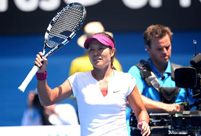 Li Na crashes Belinda Bencic in 2nd round at Australian Open
Li Na crashes Belinda Bencic in 2nd round at Australian Open Weekly sports photos
Weekly sports photos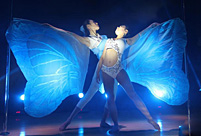 China's national pole dancing to play 'The Butterfly Love'
China's national pole dancing to play 'The Butterfly Love'  The never-ending Silk Road
The never-ending Silk Road  Spring Festival travel rush: One window, one world
Spring Festival travel rush: One window, one world Int'l Snow Sculpture Art Expo in Harbin
Int'l Snow Sculpture Art Expo in Harbin China photographs internal structure of water molecule
China photographs internal structure of water molecule 'Predator' makes proposal to girlfriend
'Predator' makes proposal to girlfriend Thousands of fish frozen on Norway sea
Thousands of fish frozen on Norway seaDay|Week|Month